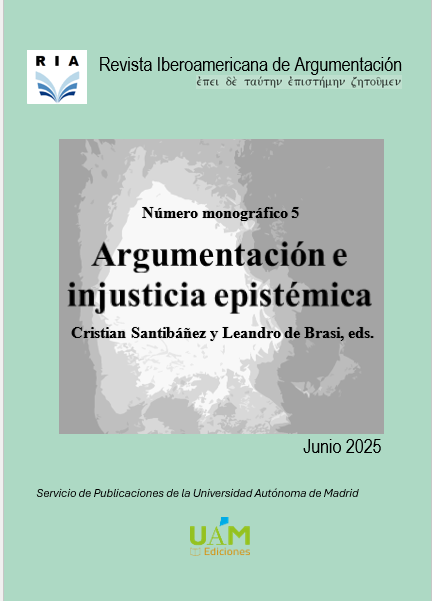Inquiry dialogues as a strategy to mitigate the deliberative risks of populist discourse
Keywords:
deliberative risk, inquiry dialogue, populism, populist discourse, the peopleCopyright (c) 2025 Daniel Mejía S., Júlder A. Gómez Posada, Laura Rojas Saldarriaga, Nataly Pineda Castañeda

This work is licensed under a Creative Commons Attribution-NonCommercial-NoDerivatives 4.0 International License.
Abstract
Populist discourse constitutes “the people” discursively and declares its interests, goals or values, such as the struggle against the elite. In order to satisfy the “people”, these interests, goals or values must be realized. However, these interests do not necessarily correspond to what the majority of citizens would prefer. Thus, if, in the absence of reliable information about what the members of a society want and prefer, each citizen deliberates about what should be done, taking as a starting point only the populist discourse, citizen deliberation may be ill-founded, it may assume that most people are interested in what populist discourse says is in the interest of “the people”. To prevent and remedy these deliberative risks, we propose to make large-scale use of the type of dialogues that, following Walton and Krabbe, we call “inquiry dialogues”.
Downloads
References
Althusser, L. (2006). Lenin and philosophy and other essays (B. Brewster, Tr.). Aakar Books.
Burke, K. (1966). Language as symbolic action: Essays on life, literature and method. University of California Press.
Charland, M. (1987). Constitutive rhetoric: The case of the peuple québécois. Quarterly Journal of Speech, 73(2), 133–150. DOI. 10.1080/00335638709383799
Finlayson, A. (2022). “Brexit, YouTube and the Populist Rhetorical Ethos”. En C. Kock and L. Villadsen (Eds.), Populist Rhetorics: Case Studies and a Minimalist Definition (pp. 81-106). Palgrave. DOI. 10.1007/978-3-030-87351-6_4
Gallie, W. (1998). Conceptos esencialmente impugnados (G. Ortiz, Tr.). Cuadernos de crítica, 49, 1- 42.
Giraldo Ramírez, J. (2018). Populistas a la colombiana. Debate.
Gustavo Petro. (22/05/2022). Discurso Gustavo Petro en cierre de campaña en Bogotá - 22 de mayo de 2022 [Video YouTube]. https://www.youtube.com/watch?v=fqdN8UYsw6w&list=WL&index=20
Hatzisavvidou, S. (2022). “The Rhetorical Strategy of Moralisation: A Lesson from Greece”. En C. Kock and L. Villadsen (Eds.), Populist Rhetorics: Case Studies and a Minimalist Definition (pp. 141-164). Palgrave. DOI. 10.1007/978-3-030-87351-6_6
Johnson, P. E. (2022). “Populist Melancholy”. En C. Kock and L. Villadsen (Eds.), Populist Rhetorics: Case Studies and a Minimalist Definition (pp. 21-48). Palgrave. DOI. 10.1007/978-3-030-87351-6_2
Kock, C. & Villadsen, L. (2022). “Populism: A Definition Sought and Tested”. En C. Kock and L. Villadsen (Eds.), Populist Rhetorics: Case Studies and a Minimalist Definition (pp. 217-247). Palgrave. DOI. 10.1007/978-3-030-87351-6_9
Laclau, E. (2005). La razón populista (S. Laclau, Tr.). Fondo de Cultura Económica.
Laclau, E. (2009). “Populismo: ¿Qué nos dice el nombre?” En F. Panizza (Ed.), El populismo como espejo de la democracia (pp. 51-70). Fondo de Cultura Económica.
Lee, M. (2006). The Populist Chameleon: The People’s Party, Huey Long, George Wallace, and the Populist Argumentative Frame. Quarterly Journal of Speech 92, 356, 357.
Ostiguy, P. (2022). “The Voice and Message of Hugo Chávez: A Rhetorical Analysis”. En C. Kock and L. Villadsen (Eds.), Populist Rhetorics: Case Studies and a Minimalist Definition (pp. 187-216). Palgrave. DOI. 10.1007/978-3-030-87351-6_8
Ownby, J. (18/03/2024). Los seis temas que Petro propone para su idea de Asamblea Constituyente. El País. https://elpais.com/america-colombia/2024-03-18/los-seis-temas-que-petro-propone-para-su-idea-de-asamblea-constituyente.html
Presidencia de la República – Colombia. (01/05/2024). Presidente Gustavo Petro durante la conmemoración del Día de los trabajadores y trabajadoras 2024 [Video YouTube]. https://www.youtube.com/watch?v=8lUGQYt7Z2I
Rancière, J. (1996). El Desacuerdo: Política y filosofía (H. Pons, Tr.). Ediciones Nueva Visión.
Rolfe, M. (2016). The Reinvention of Populist Rhetoric in The Digital Age: Insiders & Outsiders in Democratic Politics. Palgrave Macmillan, Rhetoric, Politics and Society. DOI. 10.1007/978-981-10-2161-9
Stavrakakis, Y. (2018). Paradoxes of Polarization: Democracy’s Inherent Division and the (Anti) Populist Challenge. American Behavioral Scientist, 1-16. DOI. 10.1177/0002764218756924
Tenemos que Hablar Colombia. (2022). Colombia a escala. Informe técnico. Recuperado de https://tenemosquehablarcolombia.co/informes/tecnico.pdf
Toro, L. (2018). El populismo como un concepto complejo: un reto para las definiciones clásicas. Revista Humanismo y Sociedad 6(1), 32-48.
Walton, D. N. & Krabbe, E. C. W. (2017). Argumentación y normatividad dialógica: Compromisos y razonamiento interpersonal. Palestra, Derecho & Argumentación, Vol. 9.
Walton, D. N. (1998). The New Dialectic: Conversational Contexts of Argument. University of Toronto Press.
Zarefsky, D. & Mohammed, D. (2020). “The Rhetorical Stance of Populism”. En I. van der Geest, H. Jansen, & B. van Klink (Eds.), Vox Populi: Populism as a Rhetorical and Democratic Challenge (pp. 17-28). Edward Elgar Publishing.
Žižek, J. (1992). El sublime objeto de la ideología (I. Vericat Nuñez, Tr.). Siglo XXI editores.

